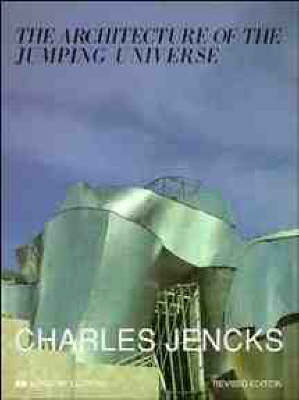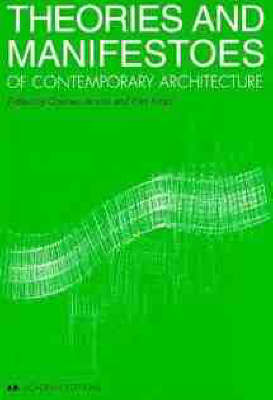academy editions
2 total works
Charles Jencks has the uncanny capacity to announce a new movement in architecture before it has begun. With Post-Modernism, he was looking to the past. Now, for the first time, with his new book on morphogenesis he is taking a look at the future. There is no question that his argument will have an important critical effect on architecture at the beginning of the new millennium. Peter Eisenman. Architect A new paradigm is sweeping through science, changing both our view of the universe and of mankind. Charles Jencks is one of a handful of thinkers with the courage to embrace the emerging paradigm and interpret it architecturally. This inspired synthesis of art, design, science and philosophy charts a bold new course not only for architecture, but for Post-Modern thought. Paul Davies, Professor of Natural Philosophy, University of Adelaide, author of The Cosmic Blueprint, Superforce, The Mind of God and other books on contemporary science. Who else could have written a book that opens up such cosmic perspectives and still make such neat, sharply focused comments on particular architects and particular styles of architecture?
Who else could range with such zest, ease and elegance from Chaos to Bruce Goff, from Coleridge to Frank Gehry, from Complexity Theory to Green Buildings? The old question of in which style should we build can never be addressed in the same way again. Charles Jencks has brought purpose back into architecture. His teleology may transcend what architects are used to, but Jencks manages to make far more sense out of our contemporary architectural dilemmas than practically all the other books in the RIBA book shop. Francis Duffy, Chairman of DEGW International Ltd
Who else could range with such zest, ease and elegance from Chaos to Bruce Goff, from Coleridge to Frank Gehry, from Complexity Theory to Green Buildings? The old question of in which style should we build can never be addressed in the same way again. Charles Jencks has brought purpose back into architecture. His teleology may transcend what architects are used to, but Jencks manages to make far more sense out of our contemporary architectural dilemmas than practically all the other books in the RIBA book shop. Francis Duffy, Chairman of DEGW International Ltd
Theories and Manifestos of Contemporary Architecture
by Charles Jencks and Karl Kropf
Published 22 July 1997
The last forty years have seen an outburst of theories and manifestoes which explore the possibilities of architecture: its language, evolution and social relevance. With the many crises in architecture and the obvious urban and ecological problems., Modernism has been criticised, questioned, overthrown, extended, subverted and revivified not a peaceful time for architectural thought and production. The result has been a cascade of new theories, justifications and recipes for building. This anthology, edited by the well-known historian and critic Charles Jencks, and the urbanist and theorist Karl Kropf, collects the main texts which define these changes. Essential for the student and practitioner alike, it presents over 120 of the key arguments of today's major architectural philosophers and gurus. These show that the Modern architecture of the early part of this century has mutated into three main traditions: a critical and ecological Post-Modernism; a High-Tech and sculptural Late Modernism; and a deconstructive, subversive New Modernism.
Here are the seminal texts of James Stirling, Robert Venturi, Colin Rowe, Christopher Alexander, Frank Gehry, Reyner Banham, Bernard Tschumi, Rem Koolhaas and many others who have changed the discourse of architecture. Here also are the anti-Modern texts of the traditionalists Leon Krier, Demetri Porphyrios, Quinlan Terry, Prince Charles and others. Many of these texts are concise, edited varsions of influential books. Highly informative and richly illustrated with over forty drawings and photographs, this volume is a vital learning and teaching tool for all those interested in the philosophies of contemporary architecture.
Here are the seminal texts of James Stirling, Robert Venturi, Colin Rowe, Christopher Alexander, Frank Gehry, Reyner Banham, Bernard Tschumi, Rem Koolhaas and many others who have changed the discourse of architecture. Here also are the anti-Modern texts of the traditionalists Leon Krier, Demetri Porphyrios, Quinlan Terry, Prince Charles and others. Many of these texts are concise, edited varsions of influential books. Highly informative and richly illustrated with over forty drawings and photographs, this volume is a vital learning and teaching tool for all those interested in the philosophies of contemporary architecture.

